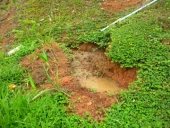posted 14 years ago
Hello Sergio,
It is a little difficult to answer specific questions without being familiar with your area, although, permaculture principles can apply everywhere.
I don't know how familiar you are with those principles, but they are easily found on the internet. Just knowing those principles won't answer all your questions though, but they can tell you how to apply the knowledge you will have to learn in order to make your project a success.
It is very important to first have knowledge of your local plants, ecosystems, etc. Once you are familiar with those, you can start to use the Perm. Principles to manage your operation.
To us, we mostly consider permaculture a system to guide us in the natural use of our land for our farm. Using plant guilds to create optimum growing conditions for all the plants involved, microclimates, etc., is just part of it. Shaping the land to take advantage of rain, snow, and the other things nature throws your way is another. This involves a fair amount of knowledge, which is something you and the folks involved with you will have to acquire. Permaculture designers are available to do this for people who prefer to hire that done for them. In our case, we preferred to dive in and learn it ourselves.
People like Sepp Holzer have spent their lives trying this, then that, then something else to find what works in their little corner of the world. This is something you will have to do also.
I can give you some ideas in regards to your questions, as we are also farming some hillside ground, but it takes your own observations and efforts to try different thing to find out what works for you.
In regards to water, ponds are one of the things you can try to hold water for your needs. Then you can also use them for fish, swimming, and anything else you might think of. You can do series of ponds, that are connected and the water flows controlled by gravity, pumps, gates, all sorts of things.
Cisterns are used a lot also, which eliminate water losses to evaporation.
If you look at Der Krameterhoff, Sepp Holzers place, he has many ponds located on his hillsides, which he uses to great effect.
With only 10 acres of pasture, you are going to end up buying a lot of feed, unless you scale down the amount and size of the animals you put on it. We think pasture land is a waste of land. We prefer animals that can graze in the forest, in what we grow there. You will have to find out what your animals like to eat, then plant those. We opted for goats for right now, since they will eat what grows here. We had wanted to go with the Dexter cows, but the price was too high, they would also have eaten what grows here and are a small breed that would have not used up too much of the available resources.
If you are going to have animals, you will either have to learn to process them into food, or find a market to sell them at, unless you keep all females. If you are going for milk, you are going to have offspring, which means either butchering or selling them.
Swales generally only direct water to where you want it to go. If you have rich soil, it will hold a lot of water the water runs, but will not hold it indefinitely. You can place woody debris along or under the swales to maximize this effect. You can use swales to direct water to ponds, if you go that route. You can also use plants to slow down the water and allow more of it to soak into the ground, providing the ground is able to absorb water.
So far as optimizing pastures, as I said, we don't like them. They tend to be monocultures that you have to constantly baby sit in order to keep them productive. We think it is better to have forested glens that contain plants suitable to the animals, with the surrounding forest containing plants that are beneficial to us, each other, and the animals using the forest. If you prefer pastures, then you may want to consider plants like vetch or other legumes that will improve your soil and provide feed in the process. What you plant will depend on your area and what your allowed to have.
We only have 20 acres, but even at that we are starting with just a small part of it, improving that, learning what works, what doesn't, you may want to consider the same. We have a plan for the whole, but only work with a small part of it at a time.
Good luck to you.
















































